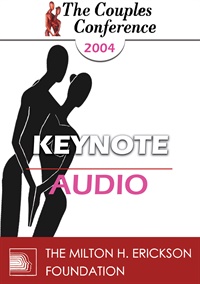
- Average Rating:
- Not yet rated
- Topic Areas:
- Keynotes | Couples Therapy | Neurobiology | Love | Neuroscience | Sex and Sexuality
- Categories:
- Couples Conference | Couples Conference 2004
- Faculty:
- Helen E. Fisher, PhD
- Duration:
- 1:03:38
- Format:
- Audio Only
- Original Program Date:
- Mar 28, 2004
- Short Description:
- Dr. Fisher will present an fMRI study of intense romantic love, a primary mating drive, and the impact of this brain circuitry on human sexuality, human marital stability and therapy using SSRI antidepressants.
- Price:
- $15.00 - Base Price
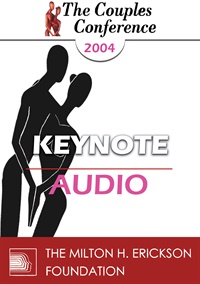
- Average Rating:
- Not yet rated
- Topic Areas:
- Keynotes | Couples Therapy | Neurobiology | Neuroscience | Therapist Development
- Categories:
- Couples Conference | Couples Conference 2004
- Faculty:
- Pat Love, EdD
- Duration:
- 58:32
- Format:
- Audio Only
- Original Program Date:
- Mar 28, 2004
- Short Description:
- During the past five years, the field of neuroscience has given us an overwhelming amount of information related to couples therapy. It is now up to us as clinicians to integrate this knowledge into our practice. Join the challenge, as we use these exciting new facts to help couples move from the relational log-jam to lasting change.
- Price:
- $15.00 - Base Price
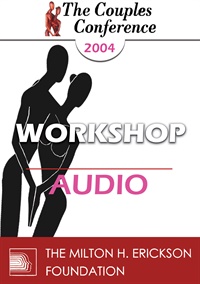
- Average Rating:
- Not yet rated
- Topic Areas:
- Workshops | Couples Therapy | Anger | Therapist Development
- Categories:
- Couples Conference | Couples Conference 2004
- Faculty:
- Peter Pearson, PhD
- Duration:
- 2:02:37
- Format:
- Audio Only
- Original Program Date:
- Mar 28, 2004
- Short Description:
- Chronically angry, hostile, distancing and rigid couples are a clinical and personal challenge. In this workshop, you will learn to change the trajectory of therapy as soon as entrenched patterns are noticed, to stay out of their conflict, and stay calm in the middle of their storm.
- Price:
- $15.00 - Base Price
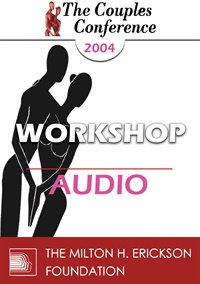
- Average Rating:
- Not yet rated
- Topic Areas:
- Workshops | Couples Therapy | Domestic Violence | Abuse
- Categories:
- Couples Conference | Couples Conference 2004 | Pioneers in Couples and Family Therapy
- Faculty:
- Cloe Madanes, HDL, LIC
- Duration:
- 1:53:07
- Format:
- Audio Only
- Original Program Date:
- Mar 28, 2004
- Short Description:
- Exploration of structured strategies for working with violent couples including separation, involving extended family, and addressing spiritual pain. Emphasis on planned interventions, repentance, and accountability from the abusive partner. Techniques discussed include executive meetings in public settings, symbolic rituals, and financial consequences to deter violence. Madanes highlights the role of reparation, community support, and social services in fostering safety and potential reconciliation.
- Price:
- $15.00 - Base Price

- Average Rating:
- Not yet rated
- Topic Areas:
- Workshops | Domestic Violence | Marriage
- Categories:
- Couples Conference | Couples Conference 2004 | Pioneers in Couples and Family Therapy
- Faculty:
- Cloe Madanes, HDL, LIC
- Duration:
- 1:49:09
- Format:
- Audio Only
- Original Program Date:
- Mar 28, 2004
- Short Description:
- Madanes outlines creative, behavior-based strategies for preventing marital violence, including Ericksonian-inspired contracts with antagonists and weekly public “executive meetings.” She emphasizes positive negotiation, cultural sensitivity, and actionable expressions of love over quid pro quo dynamics. Highlights include the value of structured commitments, “fun lists,” and involving real or surrogate family members to support change and improve relationship dynamics.
- Price:
- $15.00 - Base Price
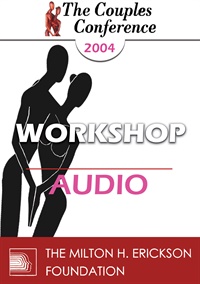
- Average Rating:
- Not yet rated
- Topic Areas:
- Workshops | Attachment | Couples Therapy | Divorce | Marriage | Neuroscience
- Categories:
- Couples Conference | Couples Conference 2004
- Faculty:
- Helen E. Fisher, PhD
- Duration:
- 1:51:10
- Format:
- Audio Only
- Original Program Date:
- Mar 28, 2004
- Short Description:
- This workshop discusses the brain circuitry of the three primary mating emotions: lust, attraction and attachment. It traces the evolution of these emotion systems and illustrates how their neural circuitry contributes to contemporary patterns of marital harmony and discord including adultery; divorce; stalking behavior; clinical depression due to rejection in love; and other issues brought to contemporary couples therapy.
- Price:
- $15.00 - Base Price
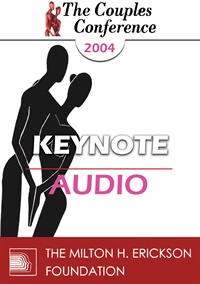
- Average Rating:
- Not yet rated
- Topic Areas:
- Keynotes | Couples Therapy | Neurobiology | Intimacy | Neuroscience | Attention Deficit Disorder (ADD)
- Categories:
- Couples Conference | Couples Conference 2004
- Faculty:
- Daniel Amen, MD
- Duration:
- 57:26
- Format:
- Audio Only
- Original Program Date:
- Mar 27, 2004
- Short Description:
- This keynote explores how brain function shapes intimacy, trust, and emotional connection in relationships. Participants learn how areas like the prefrontal cortex, temporal lobes, and limbic system influence empathy, impulse control, and attachment. The session offers a brain-based framework for understanding marital conflict, trauma, and communication struggles, showing how optimizing brain health can restore compassion, flexibility, and lasting partnership.
- Price:
- $15.00 - Base Price
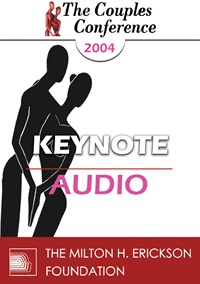
- Average Rating:
- Not yet rated
- Topic Areas:
- Keynotes | Love | Couples Therapy | Relational Recovery Therapy (RRT)
- Categories:
- Couples Conference | Couples Conference 2004 | Pioneers in Couples and Family Therapy
- Faculty:
- Terry Real, LICSW
- Duration:
- 59:41
- Format:
- Audio Only
- Original Program Date:
- Mar 27, 2004
- Short Description:
- This talk presents the core principles of Relational Recovery Therapy, focusing on the relational imbalance between men and women. It examines the enduring 50% divorce rate and the impact of traditional gender roles—men socialized for dominance, women increasingly seeking emotional intimacy. The approach calls for therapists to support women’s empowerment while helping men confront grandiosity and develop relational accountability, aiming to foster mutual connection and growth.
- Price:
- $15.00 - Base Price
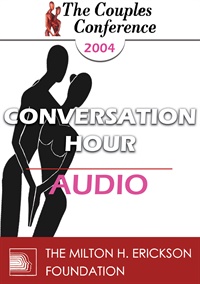
- Average Rating:
- Not yet rated
- Topic Areas:
- Conversation Hours | Couples Therapy | Grief
- Categories:
- Couples Conference | Couples Conference 2004
- Faculty:
- Jeffrey Zeig, PhD
- Duration:
- 1:00:29
- Format:
- Audio Only
- Original Program Date:
- Mar 27, 2004
- Short Description:
- CC04 Conversation Hour 02 - Couples and Grief - Jeffrey Zeig, Ph.D.
- Price:
- $15.00 - Base Price
Tags: Couples Therapy Grief
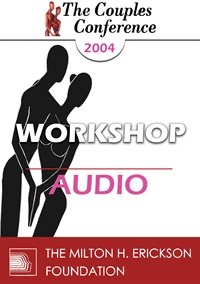
- Average Rating:
- Not yet rated
- Topic Areas:
- Workshops | Attention Deficit Disorder (ADD) | Couples Therapy | Neurodiversity | Neuroscience
- Categories:
- Couples Conference | Couples Conference 2004
- Faculty:
- Daniel Amen, MD
- Duration:
- 2:07:38
- Format:
- Audio Only
- Original Program Date:
- Mar 27, 2004
- Short Description:
- This workshop examines how attention deficit disorder affects intimacy, communication, and family stability. Participants learn to recognize the neurological roots of impulsivity, distraction, and emotional reactivity, and how these patterns strain relationships. The session offers practical, brain-based strategies—including lifestyle changes, supplements, and therapy approaches—to improve focus, empathy, and connection for individuals and couples living with ADD.
- Price:
- $15.00 - Base Price
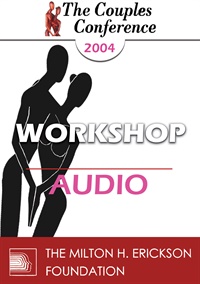
- Average Rating:
- Not yet rated
- Topic Areas:
- Workshops | Love | Avoidant | Addiction
- Categories:
- Couples Conference | Couples Conference 2004 | Pioneers in Couples and Family Therapy
- Faculty:
- Terry Real, LICSW
- Duration:
- 1:48:39
- Format:
- Audio Only
- Original Program Date:
- Mar 27, 2004
- Short Description:
- This workshop examines the dynamics of love addiction and avoidance, linking them to early experiences of abandonment and enmeshment. It challenges cultural norms around gender, highlighting the common pairing of love-dependent women and love-avoidant men shaped by patriarchy. The speaker emphasizes healthy self-esteem, emotional boundaries, and the need for mature relational development. Practical tools like feelings journals support the shift toward vulnerability, intimacy, and emotionally grounded masculinity.
- Price:
- $15.00 - Base Price
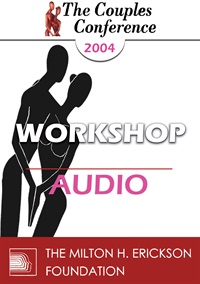
- Average Rating:
- Not yet rated
- Topic Areas:
- Workshops | Couples Therapy | Marriage | Passive-Aggressiveness | Relationships
- Categories:
- Couples Conference | Couples Conference 2004
- Faculty:
- Peter Pearson, PhD
- Duration:
- 1:58:12
- Format:
- Audio Only
- Original Program Date:
- Mar 27, 2004
- Short Description:
- The classic passive-aggressive person is a help-rejecting complainer who will not follow through with carefully crafted agreements and seems to be immune to targeted insights. They often end up with a despairing partner.
- Price:
- $15.00 - Base Price
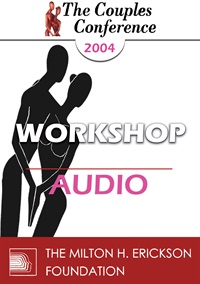
- Average Rating:
- Not yet rated
- Topic Areas:
- Workshops | Relational Life Therapy Model (RLT) | Couples Therapy | Intimacy | Therapist Techniques
- Categories:
- Couples Conference | Couples Conference 2004 | Pioneers in Couples and Family Therapy
- Faculty:
- Terry Real, LICSW
- Duration:
- 1:43:38
- Format:
- Audio Only
- Original Program Date:
- Mar 27, 2004
- Short Description:
- This workshop presents key principles of Relational Recovery Therapy, focusing on resolving intimacy issues through structured dialogue, clear roles, and mutual accountability. It outlines the importance of addressing self-medication, psychiatric issues, and acting out before working on connection. Practical guidance includes teaching skills, setting respectful boundaries, and fostering support networks. The approach emphasizes assertive communication and shared responsibility to build healthy, empowered relationships.
- Price:
- $15.00 - Base Price

- Average Rating:
- Not yet rated
- Topic Areas:
- Workshops | Anxiety | Couples Therapy | Depression | Divorce | Marriage | Relationships
- Categories:
- Couples Conference | Couples Conference 2004
- Faculty:
- Pat Love, EdD
- Duration:
- 1:46:45
- Format:
- Audio Only
- Original Program Date:
- Mar 27, 2004
- Short Description:
- Anxiety and depression are fast becoming the leading causes of personal disability and the single greatest destructive force in relationships. Research indicates that when one person in a relationship is depressed, the divorce rate goes up nine times. Therefore, it is vital that therapists learn to recognize typical and atypical symptoms early in therapy. It also is imperative that symptoms of relational depression are recognized. Lecture, video, written exercises and demonstration will be used.
- Price:
- $15.00 - Base Price
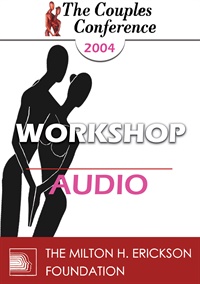
- Average Rating:
- Not yet rated
- Topic Areas:
- Workshops | Narcissism | Differentiation | Relationships
- Categories:
- Couples Conference | Couples Conference 2004 | Pioneers in Couples and Family Therapy
- Faculty:
- Ellyn Bader, PhD
- Duration:
- 1:43:12
- Format:
- Audio Only
- Original Program Date:
- Mar 27, 2004
- Short Description:
- Dive into the complexities of narcissistic relationships through case studies and therapeutic techniques. Learn how to help couples navigate emotional barriers, develop empathy, and build deeper intimacy by understanding the developmental roots of narcissistic behavior and practicing effective differentiation strategies.
- Price:
- $15.00 - Base Price
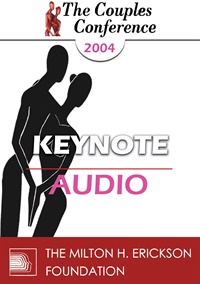
- Average Rating:
- Not yet rated
- Topic Areas:
- Keynotes | Marriage | Strategic Therapy | Therapist Development
- Categories:
- Couples Conference 2004 | Couples Conference | Pioneers in Couples and Family Therapy
- Faculty:
- Cloe Madanes, HDL, LIC
- Duration:
- 1:01:11
- Format:
- Audio Only
- Original Program Date:
- Mar 26, 2004
- Short Description:
- Madanes presents strategies for resolving marital challenges that are grounded in core human needs like certainty, love, and growth. She critiques the influence of managed care and psychopharmacology, advocating for a more human-centered therapeutic approach. She encourages therapists to reclaim authenticity, address double binds, and recognize the hidden benefits of despair. She also introduces a collaboration with Anthony Robbins to develop ethical, strategic interventions for lasting change.
- Price:
- $15.00 - Base Price
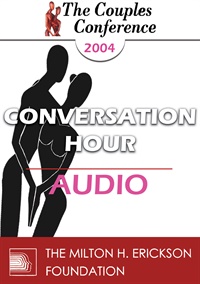
- Average Rating:
- Not yet rated
- Topic Areas:
- Marriage | Couples Therapy | Conversation Hours
- Categories:
- Couples Conference | Couples Conference 2004 | Pioneers in Couples and Family Therapy
- Faculty:
- Cloe Madanes, HDL, LIC
- Duration:
- 1:01:34
- Format:
- Audio Only
- Original Program Date:
- Mar 26, 2004
- Short Description:
- Focuses on practical strategies for addressing marital dilemmas in therapy. Topics include redefining infidelity to support reconciliation, using indirect negotiation through role-play, and incorporating humor to ease conflict. Emphasizes cultural sensitivity, therapist neutrality, and helping clients consider diverse perspectives on relationships and commitment.
- Price:
- $15.00 - Base Price

- Average Rating:
- Not yet rated
- Topic Areas:
- Dialogues | Affairs | Couples Therapy | Intimacy | Sex and Sexuality
- Categories:
- Couples Conference | Couples Conference 2004
- Faculty:
- Esther Perel, MA, LMFT | Janis Abrahms Spring, PhD, ABPP
- Duration:
- 55:21
- Format:
- Audio Only
- Original Program Date:
- Mar 26, 2004
- Short Description:
- This lively dialogue brings two influential clinicians together to explore affairs, eroticism and the shifting meanings of intimacy. Through audience questions and spirited exchange, they examine secrecy, monogamy, cultural norms and the private imagination, offering contrasting but complementary perspectives. Participants hear how desire, boundaries, contracts and autonomy shape modern relationships, and how therapists can navigate the tensions between honesty, privacy, commitment and erotic vitality.
- Price:
- $15.00 - Base Price
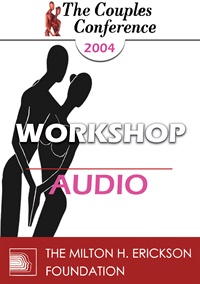
- Average Rating:
- Not yet rated
- Topic Areas:
- Workshops | Confrontation | Therapist Techniques
- Categories:
- Couples Conference | Couples Conference 2004 | Pioneers in Couples and Family Therapy
- Faculty:
- Ellyn Bader, PhD
- Duration:
- 1:32:12
- Format:
- Audio Only
- Original Program Date:
- Mar 26, 2004
- Short Description:
- Exploration of the art of confrontation in couples therapy, balancing empathy and directness. Bader outlines six confrontation styles and shares strategies for addressing issues like addiction, trust, and conflict avoidance. Through video examples and case studies, she demonstrates how therapists can navigate complex dynamics—considering culture, gender, and individual histories—while helping clients confront passivity, express motivations, and take responsibility for change.
- Price:
- $15.00 - Base Price
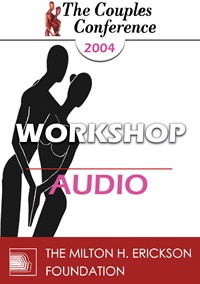
- Average Rating:
- Not yet rated
- Topic Areas:
- Workshops | Couples Therapy | Multicultural | Religion | Gender
- Categories:
- Couples Conference | Couples Conference 2004
- Faculty:
- Esther Perel, MA, LMFT
- Duration:
- 1:44:56
- Format:
- Audio Only
- Original Program Date:
- Mar 26, 2004
- Short Description:
- Cultural and religious differences provide the backdrop against which couples' issues of commitment, gender and child raising, as well as, family connectedness and cultural loyalty are played out. Mixed couples often face difficult decisions at key junctures in the life cycle. In this workshop, participants will learn to identify conflicts around culture and religion, tease out the cultural contexts of common couples' dilemmas, and help clients make informed choices about the role that group continuity, family tradition and cultural values will play in their lives.
- Price:
- $15.00 - Base Price
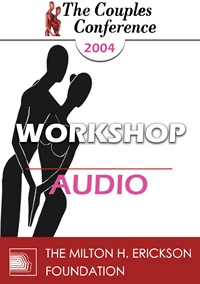
- Average Rating:
- Not yet rated
- Topic Areas:
- Workshops | Couples Therapy | Hypnosis | Hypnotherapy | Experiential Therapy | Unconscious Processes
- Categories:
- Couples Conference | Couples Conference 2004
- Faculty:
- Jeffrey Zeig, PhD
- Duration:
- 1:59:27
- Format:
- Audio Only
- Original Program Date:
- Mar 26, 2004
- Short Description:
- Hypnosis is an experiential method of "gift wrapping" ideas. With or without formal trance, hypnotic methods can be used in the assessment and intervention process of couples therapy.
- Price:
- $15.00 - Base Price
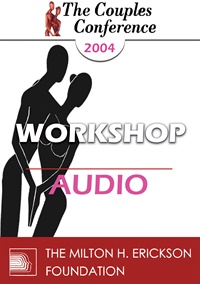
- Average Rating:
- Not yet rated
- Topic Areas:
- Workshops | Affairs | Couples Therapy | Trauma | Intimacy
- Categories:
- Couples Conference | Couples Conference 2004
- Faculty:
- Janis Abrahms Spring, PhD, ABPP
- Duration:
- 1:52:35
- Format:
- Audio Only
- Original Program Date:
- Mar 26, 2004
- Short Description:
- This workshop offers a clear, compassionate roadmap for helping couples recover from infidelity. Using a three stage model, it shows how to name the trauma of discovery, understand the unfaithful partner’s experience and make thoughtful, not impulsive, decisions about reconciliation. Participants learn concrete ways to rebuild trust, address romantic and unrequited love, challenge unrealistic beliefs about marriage and guide partners toward more mature, intentional connection.
- Price:
- $15.00 - Base Price
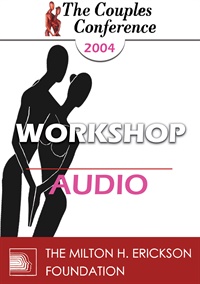
- Average Rating:
- Not yet rated
- Topic Areas:
- Workshops | Couples Therapy | Intimacy | Multicultural | Sex and Sexuality
- Categories:
- Couples Conference | Couples Conference 2004
- Faculty:
- Esther Perel, MA, LMFT
- Duration:
- 1:28:38
- Format:
- Audio Only
- Original Program Date:
- Mar 26, 2004
- Short Description:
- This workshop examines the cultural pressures that shape domesticated sex and the puzzling inverse correlation between greater emotional intimacy and the loss of sexual desire. It will demonstrate how to help couples draw pleasure from the hidden, the suggestive and the uncanny while also respecting their needs for safety and stability. Using case examples, we will explore how to grant the body its profound capacities for communicating in its own language.
- Price:
- $15.00 - Base Price

